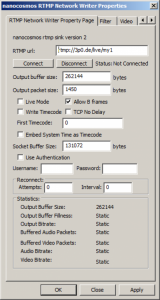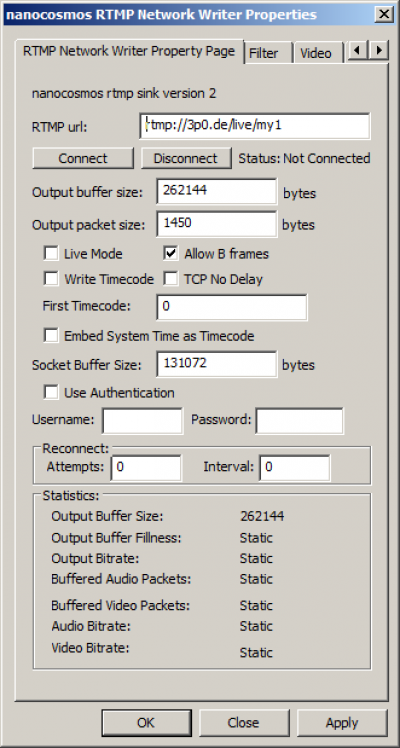DirectShow RTMP Network Renderer & Writer
Purpose
Writing RTMP compatible video/audio streams over a network connection
- Supported Architectures: Microsoft DirectShow, Windows
- Supported Formats: H.264 Video + AAC Audio
Module / Version
nanocosmos RTMP Network Writer
nRtmpRenderer.ax Version 3.0.3.1
DirectShow Connectivity
The RTMP Writer is implemented as a “Renderer Filter”, which means it only has 2 input pins for compressed video and audio and no output pin. The input is accepting connections matching the following media types:
- Pin 1 Media Types:
- MEDIATYPE_Video
Pin 1 Media Subtypes:
FourCCs:
H264,h264
Pin 1 Formats:
FORMAT_MPEG2_VIDEO,FORMAT_NONE
Pin 2 Major Media Types:
MEDIATYPE_Audio
Pin 2 Media Subtypes:
MEDIASUBTYPE_AAC,FourCC: 0x000000FF
Pin 2 Formats:
FORMAT_WaveFormatEx,FORMAT_NONE

The filter's property page offers a subset of encoding parameters, containing the most important options.
URL formatting:rtmp: [hostname / IP address]/[application]+[stream name] for example:
rtmp:127.0.0.1/live+myStream with:IP address: 127.0.0.1
Application name: live, Stream name: myStream
Configuration
The configuration may be set by using either the property page or the COM-Interface IRTMPOptions as declared in header file RTMPWriterOptions.h.
// Filter Guids
// {B4FB59C5-983B-4d96-9204-F8B0E46704EE}
DEFINE_GUID(CLSID_NANO_RTMP_WRITER, 0xb4fb59c5, 0x983b, 0x4d96, 0x92, 0x4, 0xf8, 0xb0, 0xe4, 0x67, 0x4, 0xee);
// Property Page GUID
// {EFC673DE-E20E-4699-8331-9522C5DF7A6D}
DEFINE_GUID(CLSID_NANO_RTMP_WRITER_PROPPAGE, 0xefc673de, 0xe20e, 0x4699, 0x83, 0x31, 0x95, 0x22, 0xc5, 0xdf, 0x7a, 0x6d);
// Configuration Interface GUID
// IID_IRTMPOptions interface
// {B8AF4593-BE31-449c-8485-3E6D65CBC1FE}
DEFINE_GUID(IID_IRTMPOptions, 0xb8af4593, 0xbe31, 0x449c, 0x84, 0x85, 0x3e, 0x6d, 0x65, 0xcb, 0xc1, 0xfe)
The streaming url can be set by using standard DirectShow interface IFileSinkFilter .
Configuration with DirectShow filter property page

The filter's property page offers a subset of encoding parameters, containing the most important options.
URL formatting:
rtmp:// [hostname / IP address]/[application]+[stream name]
for example:
rtmp://127.0.0.1/live+myStream
with: IP address: 127.0.0.1 Application name: live, Stream name: myStream
Connection Test
Connect/Disconnect buttons. Allows to connect before starting the graph and disconnect during the streaming (this stops the running graph).
RTMP Authentication
RTMP Authentication expects a user name and a password for unlocking access to the Media Server. RTMP Authentication is an outdated functionality not available with nanoStream Cloud.
Automatic Reconnection:
Attempts to restore network connection after n seconds to the server in case of network interrupts. During the reconnect attempts the graph still playing. 0 means no attempts to reconnect to server.
Advanced Configuration Options
The advanced options should be handled carefully. They can severely affect network and streaming performance. Contact support if you want to fine tune any settings. Buffering: Data Flow: RTMP multiplexed data → application buffer → socket buffer → network. There are 2 buffer types:
- Socket level buffer: Size of the network socket buffer, much dependent on the underlying network architecture
- Application level buffer (Output Buffer Size, Output packet size), 0=no buffer Affects bandwidth utilization, prevents bitrate changes and puts the sending process to a separate thread.
Advanced Settings
- Live Mode: Turns on/off blocking of input pins. (should be off by default)
- TCP No Delay: Activates the
TCP_NODELAYoption for TCP transmission ("Nagle Algorithm") - Timecode Options: Sends Time Code in RTMP Meta Data
- Allow B Frames: should be on, it reduces the buffer/delay in
H.264 Main Profilewithout B Frames. No effect in Baseline Mode. - Timecode Options: send Time Code in RTMP Meta Data
Connection Status Notification
There are two possibilities to get the status of the connection to the server:
- Event messages are sent via IMediaEventSink with the event code EC_NANO_RTMP_WRITER_STATUS declared in
RTMPWriterOptions.h(#define EC_NANO_RTMP_WRITER_STATUS EC_USER+181). A message is sent when the connection state changes. The different states are represented by (also declared inRTMPWriterOptions.h): RTMPWriterConnected=0RTMPWriterDisconnected=1RTMPWriterReconnecting=2- Using a callback function, which is called when the connection state changes:
- Query for the interface
IRTMPStatusNotify - Set the callback function via
SetStatusNotifyHandler()
- Query for the interface
Rtmp Writer Filter crashes when using SetStatusNotifyHandler()
This problem is probably caused by calling a function declared with one calling convention with a function pointer declared with a different calling convention. Here is a good explanation of the problem: Visual Studio Runtime Error
Conclusion: Make sure you use stdcall in your declaration
Log / Debug Configuration Registry Settings
Key: HKEYCURRENTUSER\Software\DebugNano\ nRtmpRenderer.ax
File name
Sets the output file name. The folder must exist.
Value name: LogToFile
Value type: REG_SZ / String
Valid values: a valid output file name to enable file logging or an empty string
Logging level
- A higher value increases the amount of logging messages sent, and messages get more detailed.
- Value name:
TRACE - Value type:
REG_DWORD - Valid values: 0 (minimal logging) - 9 (maximal logging)